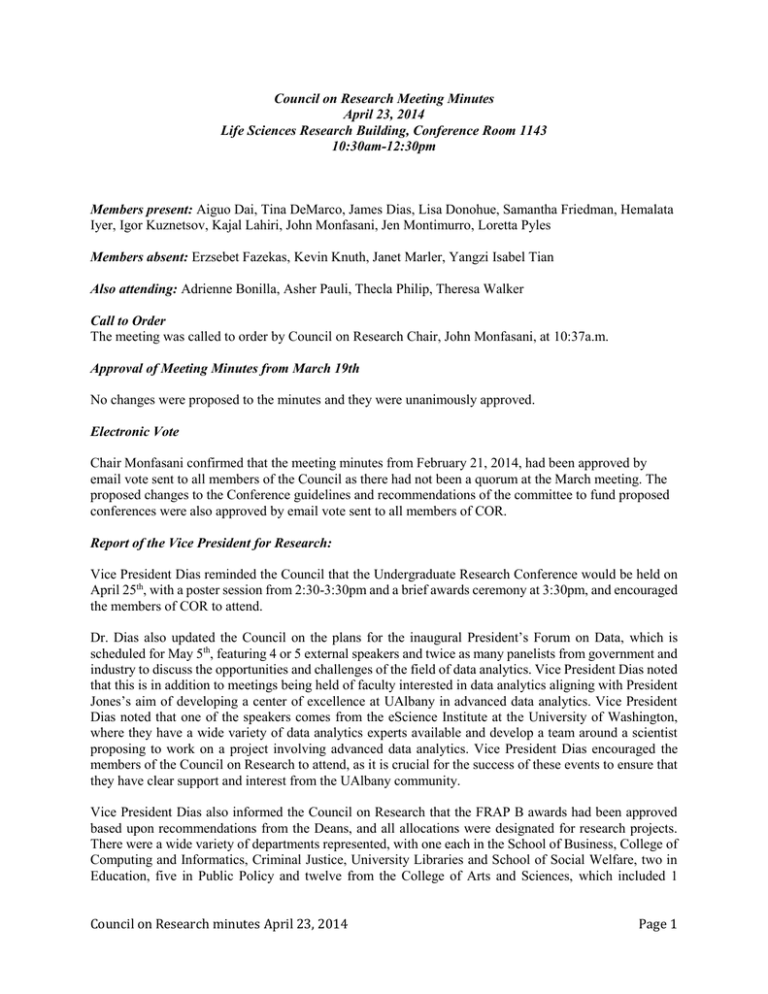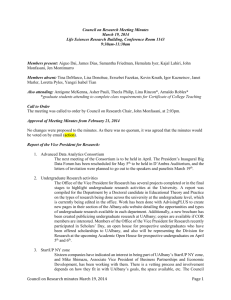April 23, 2014
advertisement

Council on Research Meeting Minutes April 23, 2014 Life Sciences Research Building, Conference Room 1143 10:30am-12:30pm Members present: Aiguo Dai, Tina DeMarco, James Dias, Lisa Donohue, Samantha Friedman, Hemalata Iyer, Igor Kuznetsov, Kajal Lahiri, John Monfasani, Jen Montimurro, Loretta Pyles Members absent: Erzsebet Fazekas, Kevin Knuth, Janet Marler, Yangzi Isabel Tian Also attending: Adrienne Bonilla, Asher Pauli, Thecla Philip, Theresa Walker Call to Order The meeting was called to order by Council on Research Chair, John Monfasani, at 10:37a.m. Approval of Meeting Minutes from March 19th No changes were proposed to the minutes and they were unanimously approved. Electronic Vote Chair Monfasani confirmed that the meeting minutes from February 21, 2014, had been approved by email vote sent to all members of the Council as there had not been a quorum at the March meeting. The proposed changes to the Conference guidelines and recommendations of the committee to fund proposed conferences were also approved by email vote sent to all members of COR. Report of the Vice President for Research: Vice President Dias reminded the Council that the Undergraduate Research Conference would be held on April 25th, with a poster session from 2:30-3:30pm and a brief awards ceremony at 3:30pm, and encouraged the members of COR to attend. Dr. Dias also updated the Council on the plans for the inaugural President’s Forum on Data, which is scheduled for May 5th, featuring 4 or 5 external speakers and twice as many panelists from government and industry to discuss the opportunities and challenges of the field of data analytics. Vice President Dias noted that this is in addition to meetings being held of faculty interested in data analytics aligning with President Jones’s aim of developing a center of excellence at UAlbany in advanced data analytics. Vice President Dias noted that one of the speakers comes from the eScience Institute at the University of Washington, where they have a wide variety of data analytics experts available and develop a team around a scientist proposing to work on a project involving advanced data analytics. Vice President Dias encouraged the members of the Council on Research to attend, as it is crucial for the success of these events to ensure that they have clear support and interest from the UAlbany community. Vice President Dias also informed the Council on Research that the FRAP B awards had been approved based upon recommendations from the Deans, and all allocations were designated for research projects. There were a wide variety of departments represented, with one each in the School of Business, College of Computing and Informatics, Criminal Justice, University Libraries and School of Social Welfare, two in Education, five in Public Policy and twelve from the College of Arts and Sciences, which included 1 Council on Research minutes April 23, 2014 Page 1 Biology, 1 History, 1 Music, 1 Anthropology, 1 Communications, 1 Psychology, 2 in Languages Literatures and Cultures, 2 in Art, and 2 in English. Committee Reports 1. Benevolent Awards review committee Committee chair Samantha Friedman noted that there was an issue with low response to the call for applications for the Benevolent Awards, which led to the deadline being extended by a week. Unfortunately of the applications received, four were disqualified as they were for funds to travel to conferences, which is specifically excluded in the guidelines for the awards. After reviewing the four remaining applications, the committee recommended funding three of them. There was some concern about whether the project referred to in the fourth application was actually an independent research project, and the proposal was poorly written. A discussion ensued that although the topic of the proposed research was a hot topic right now, it is crucial for the university to protect the quality of scholarship being undertaken, and not to fund projects based on buzzwords or a topic’s current popularity in popular culture. The recommendations of the committee were approved unanimously. 2. Centers and Institutes Committee Committee chair Kajal Lahiri informed the Council that two proposals for new centers had been received from the School of Business and one has been received from the School of Public Health. After discussion at the subcommittee meeting, it was agreed that two of the center proposals were very specific, well-planned and had the clear support of their deans. There was concern that the third center proposal was very diffuse, and lacked a clear structure and targeted mission. There were immediate concerns with details of budgets for all three centers as well as clarification required as to whether these centers were proposed at the school/college or university level. The faculty members who had proposed the centers responded quickly to the requests for additional information, and the budgets submitted reflected support from their schools/colleges and were not seeking funding from the Division for Research. A discussion then ensued as to the appropriate process for review and establishment of centers. While there is a policy document on centers and institutes at UAlbany, the mention of the process for establishment of centers is brief and does not give clear guidance institutionally as to what constitutes a center. There is a clear need to define a homogeneous standard for review of all centers, in order to protect the name of the university and the quality of scholarship being undertaken. It was agreed that a Council on Research meeting would be set up in May to enable the proposed center directors to give a brief presentation to the Council, with support from their Dean and time for questions. (action) The center proposals are to be provided to the Council along with the current procedure document prior to the meeting (action). Old business 1. FRAP guidelines revision: Proposal: rule that new faculty who have start-up funds are not eligible for FRAP The concern was raised that it seems unfair for people who have large start-up funds to also be eligible for FRAP awards; however, if new faculty have a small start-up fund amount, it would be counterproductive to make them ineligible for the award program. Council on Research minutes April 23, 2014 Page 2 There was a discussion that state money for start-up can’t be used for some of the things that FRAP funds can be used for, i.e. for human subjects research. Since the start-up funds have been State money (it used to be RF money, which is more flexible), there are more strict rules for what the funds can be used for and how they can be used. It was noted that there is also the issue that the amount of startup funds varies depending on the field. The concern was raised that excluding everyone who has any startup funding would hurt those with less start-up funds for their research. Chair John Monfasani proposed the following text based on the discussion at the March meeting: Beginning faculty with RF funding are excluded from the FRAP program. The proposal was rejected by the majority of the council on the basis that requirements should be kept general and applications should be judged on a case-by-case basis by the committee. It was also suggested that some text should be added to the wording of the guidelines that preference would be given to those without start-up funds. It was also noted that text should be added to the guidance of the review committee to look at the impact that the FRAP funding would have on the research efforts of a member of faculty, i.e. if someone has significant amounts of other funding it would have less impact than for those who have less funding available to them. It was agreed that new text would be drafted for the next meeting (action). The issue was also raised in discussion that recipients of the award often are not spending the funds within the two-year time frame given, and are asking for extensions at the end of the award period. It should be noted that FRAP is a competitive award program and the funding should be spent as planned for a project. It was also noted that applications don’t provide a timeline for using the money, and the suggestion was made that this could be a requirement in future. 2. FRAP guidelines revision: “Tenure track” requirement Discussion of the tenure track issue was tabled until the May meeting. The meeting was adjourned at 11:38am. Submitted by Elizabeth Rooks Council on Research minutes April 23, 2014 Page 3
